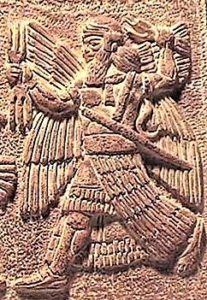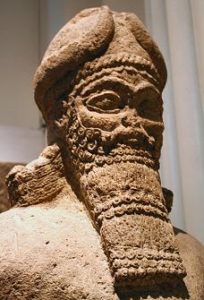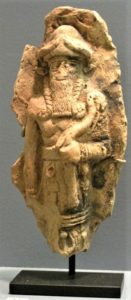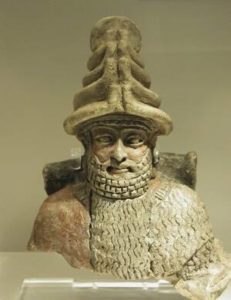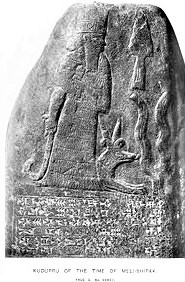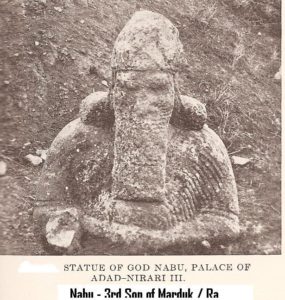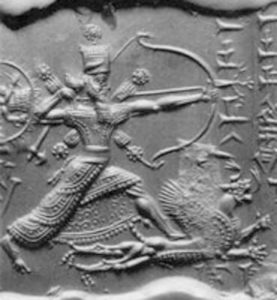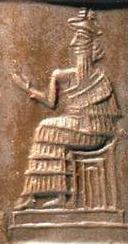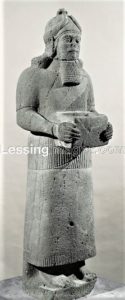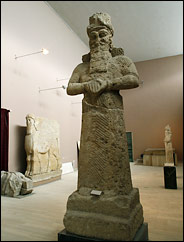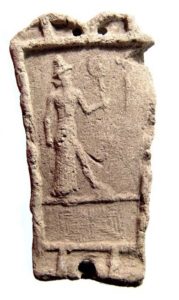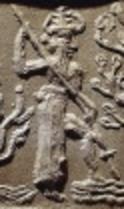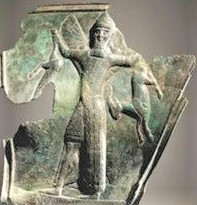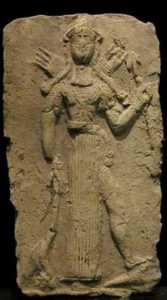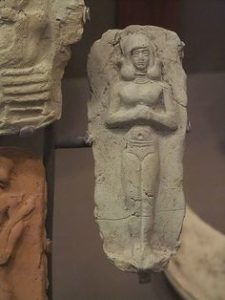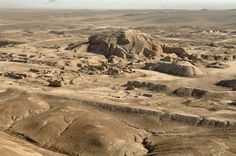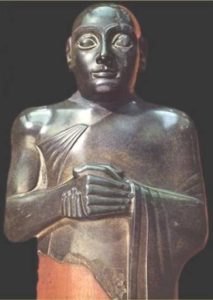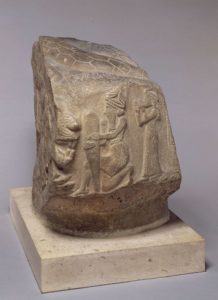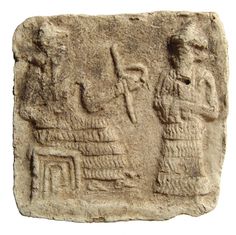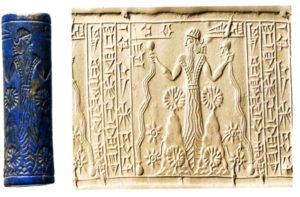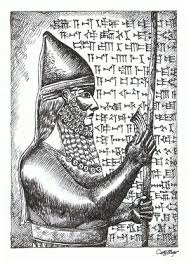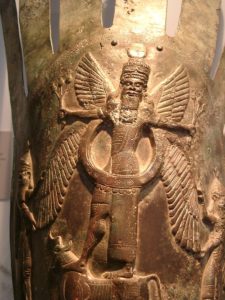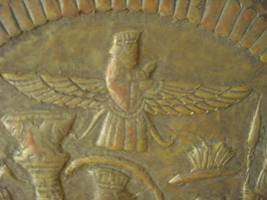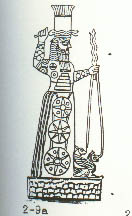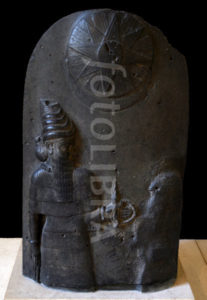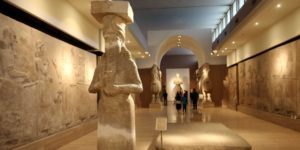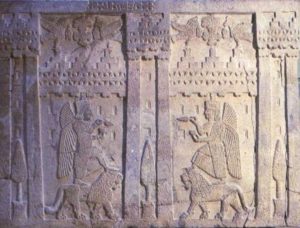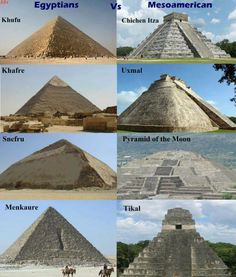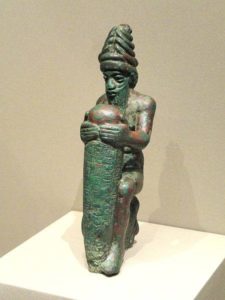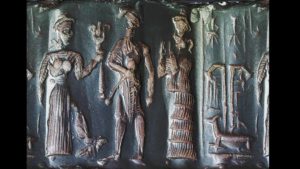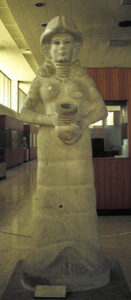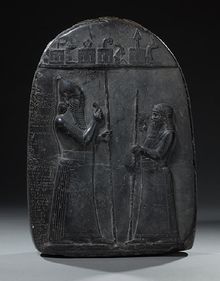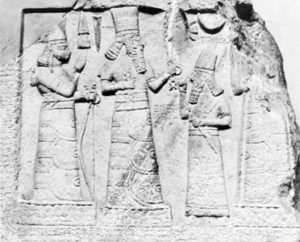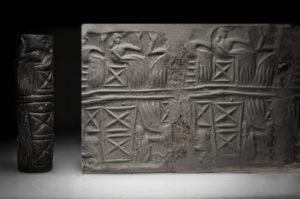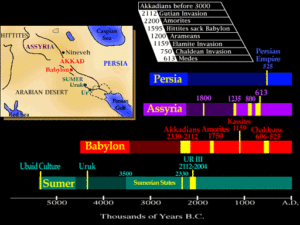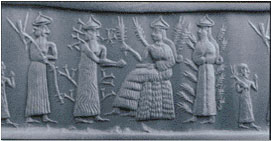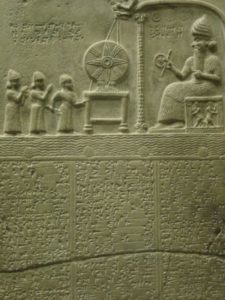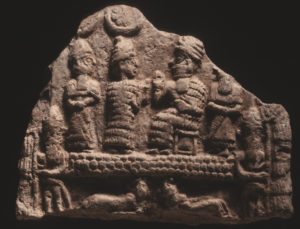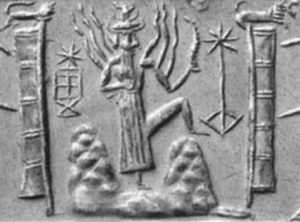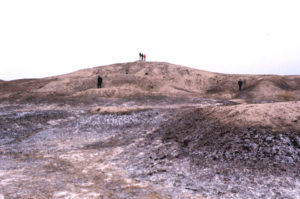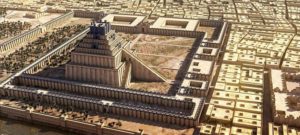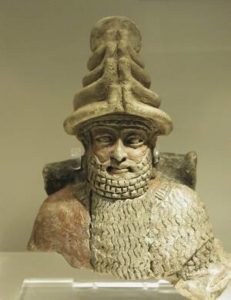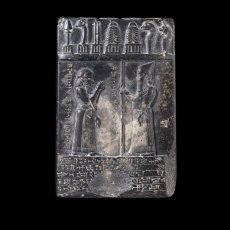http://oracc.museum.upenn.edu
(Texts: All Artifacts, Color Coding, & Writings in Bold Type With Italics Inside Parenthesis, are Added by Editor R. Brown, not the Authors, Translators, or Publishers!)
(gods in blue…mixed-breed demigods in teal)
[…] Marduk-apla-uṣur […] the Chaldean.
[…] Tigris River […] … […] … […] he k[il]led; […] … […] … […] … […] … people
[…] … […] the fifth day […] … […] … […] to Esagila.
[…] … […] … […] […]
At that time Nabû-šuma-iškun directed his attention from Babylon to his (own) land.
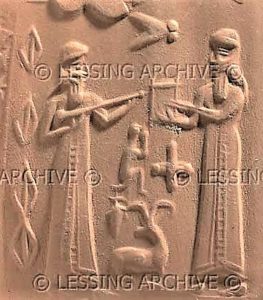 (Marduk & son Nabu the scribe)
(Marduk & son Nabu the scribe)
At the command of the gods Nabû and Marduk, <his> lords, he entered … into his house;
He did not go out again either to do battle or to go on a journey …
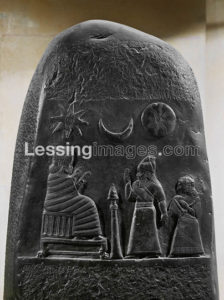 (Nanaya seated with Babylonian king before her)
(Nanaya seated with Babylonian king before her)
Further, in the third year he brought (the statue of) the goddess Nanāia (Nanaya, Nabu’s spouse) of Ezida,
the beloved of the god Nabû, into the temple’s sacred workshop.
He held back (the statue of) the god Nabû in Babylon and turned the eve of the (eššēšu)-festival
and the eššēšu-festival day (itself) into (a festival of only) one day.
With the good gar[ment] of the god Bēl (Marduk) in the month of Šabaṭu, the good garment of the god [Na]bû …
… of the god Bēl he extended to the goddess Tašmētu (Nanaya).
Hair … he made abundant … gold … he entered the sanctuary of the god Bēl, introducing …
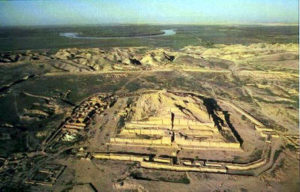
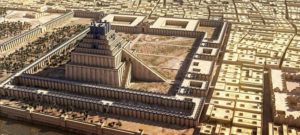 (Ezida, Marduk’s temple residence in Babylon)
(Ezida, Marduk’s temple residence in Babylon)
He introduced the leek, which is taboo to Ezida … the god Nabû,
and made those privileged to enter the temple eat (it).
The god Ea (Enki), the lord of wisdom, whose exalted dwelling …
He made (him) get up from (his) dwelling, (a place) befitting his great divinity, making (him) sit in the gate …
The god Madānu (unidentified) … Babylon … he removes his … and makes (him) go (away).
… and … … […] … […] … … […] … […] … […] she who sits on the throne […] seven lions.
[…] … and […] he trampled.
… […] … and [ … he ha]rnessed it.
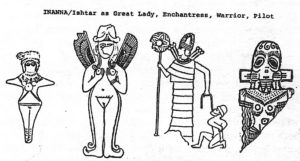 (Inanna, Goddess of Love & War)
(Inanna, Goddess of Love & War)
That which the goddess Iš[tar …] the goddess Ištar (Ishtar / Inanna) … […] he had released.
… […] he extended.
[…] the god Ninpirig (unidentified) […] he brought near.
[…] the god Nabû was detained in Babylon and […] and dwelt among the rebels.
[…] Babylon … […] he burned with fire.
[…] him, the great lord, the god Marduk, […] the god Marduk … the king went
[…] … he said […] and sets.
[…] … […] … […] … [… ] … […] …
[…] […] … […] … […]
When the splendid lord … the exemption of Bab<ylon>, Borsippa and …
And the oath which Enlil-AŠ-KUR, son of Ku-… the governor of the city Larak, had caused them (the people) <to take>,
In Babylon, Borsippa, and Kutha, he extended in the presence of the gods Bēl, Nabû, and Nergal.
Yearly he increased against them (the level of) killing, robbing, murdering,
(and) performance of feudal obligations and corvée-labour.
On a <single> day he burned (alive) sixteen Cuthians
with fire in the gate of the god Zababa (Ninurta), which is inside Babylon.
He carried off citizens of Babylon to the lands of Ḫatti and Elam as greeting-gifts.
He expelled the citizens of Babylon, their wives, children and servants, and he <settled them> in the steppe.
The house(s) of the citizens of Babylon … he piled up into heaps of ruins and turned (them) over to his palace.
(With regard to) the public square, the route of the god Šarʾur (Ashur),
beloved of his lord, who goes along the street(s) of his city in the third month,
He blocked off the roadway of his (Šarʾur’s) route and turned (it) over to his palace;
he had him (Šarʾur) go along a road which was not part of his route.
He seized Mudammiq-Adad, the son of Adad-šuma-ēreš, his ally,
without (Mudammiq-Adad having committed) any transgression or rebellion;
He carried off his (Mudammiq-Adad’s) people, as many as there were,
to the Chaldeans and Arameans as greeting-gifts.
He put at his own disposal his (Mudammiq-Adad’s) villages, fields,
houses, orchards, and possessions, as many as there were.
(With regard to) Śagab-il of the city Dūru, who in order to save (himself)
had come out from the bank of the Euphrates (and gone) before him (Nabû-šuma-iškun) with a treaty and oath,
He (Nabû-šuma-iškun) committed against him that which is taboo to princes,
(namely) insults (and) unspeakable abuse, and he counted his city as booty.
In the sixth year, he directed his attention to renovating Esagila, the palace of the Enlil of the gods (Marduk).
The property of Esagila, as much as previous kings had brought into it,
He brought out and collected inside his (own) palace; he appropriated (it) for himself:
(Namely) silver, gold, precious, valuable stones and everything befitting a divinity, as much as there was.
In accordance with his (own) desire, he installed there the gods of the Sealand, the Chaldeans, and Arameans.
He adorned his palace women (and) presented (them) as greeting-gifts to the lands of Ḫatti and Elam.
When the seventh year arrived, he went to Bīt-Dakkūri with evil intent;
Afterwards, Nabû-šuma-iškun, the Dakkurian, <in accordance with> the treaty
and the oath (sworn by the names) of the great gods,
Brought out horses, soldiers, and chariots and ordered (them) on a campaign with him.
He gave bread, fine beer, and ḫirigalû-flour to his entire camp.
On the twentieth day of the month of Addaru, the day … to the gods Šamaš (Shamash / Utu) and Marduk,
he did not respect (his sworn) treaty and oath;
The people, as many as were encamped in green pastures, held joyful celebrations.
[…] […] … […] […] the god Bēl [… he] settled.
[…] the god Sîn (Sin / Nannar) […] [… in] the shrine […] […] … […] … [… Bab]ylon [… he estab]lished them.
[…] … […] Babylon […] … [… that] he had gathered […] … […] let me send.
[…] the great lord, the god Marduk […] … glared;
[…] … they removed him and […] he plundered […] of his house.
[…] … his/its survivor(s) […] he was confined;
[…] the fugitive […] he turned back; […] the land of Akkad […] he burned.
[…] … Borsippa […] … Dilbat and Cutha.
[…] against him for a leader […] their […] he plunders their possessions.
[…] … he went and […] … the governor of Larak.
[… the treat]y and oath (sworn by the names of) the great gods, seven times […] … and they seized with him.
[…] these men … without (any) transgression […] … he seized;
[…] … he took them and […] settled them [in the ste]ppe.
[…] … to the bitter water […] them.
[…] he reached and the god Nabû, who before […] he held back in Babylon.
[…] … […] … he had made; […] and the god Nabû, the august heir […] he plundered it, they said.
[…] […] … […] […] … […] …
